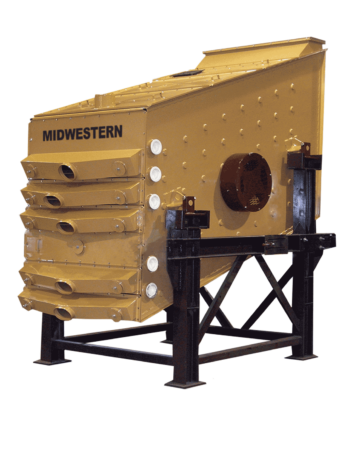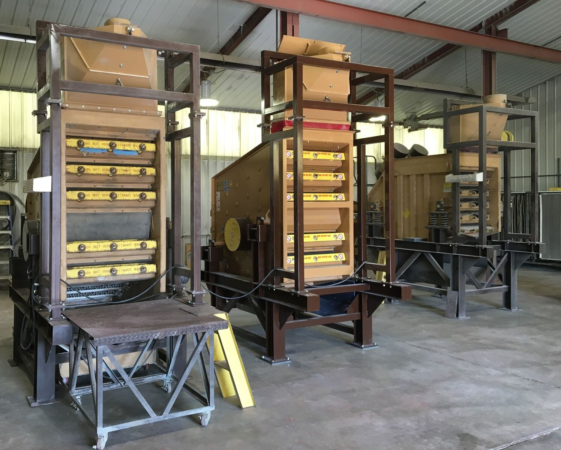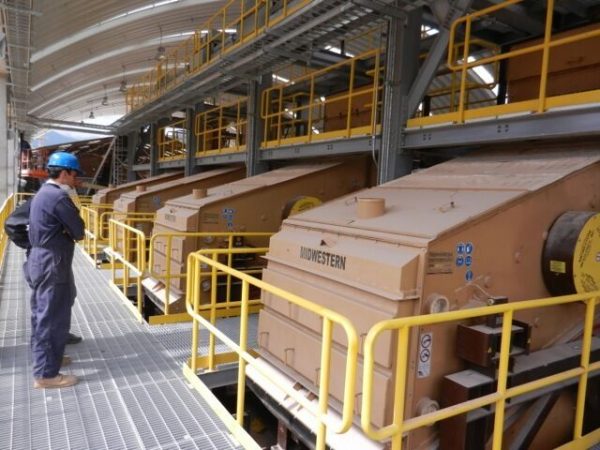
Optimizing screening productivity for EOL rubber tire material recovery
Don Horne
Features News ipptEnsuring optimal and sustainable screening equipment processes and productivity is vital for a vast range of processing industries.
When investing in expensive capital screening equipment, therefore, it is critical to remove any guess work. Conducting advanced screening testing prior to this investment can provide end-users with essential quantitative data to protect their investment. This is critical to accomplishing long-term screening goals.
 Midwestern Industries, Inc. recently conducted a ‘real-time,’ full-scale material test for a market leader in green technology for material recovery from end-of-life (EOL) tires–eliminating essential consistency issues they were facing. Conducted at their recently expanded 10,000 Sq. Ft. Midwestern Materials Testing Lab, a staff of Midwestern screening professionals worked closely with the ISO 9001: 2015 Certified company’s Superintendent, who was trying to achieve a specific size particle to their ground rubber end product that recovers carbon black and other chemicals from EOL tires.
Midwestern Industries, Inc. recently conducted a ‘real-time,’ full-scale material test for a market leader in green technology for material recovery from end-of-life (EOL) tires–eliminating essential consistency issues they were facing. Conducted at their recently expanded 10,000 Sq. Ft. Midwestern Materials Testing Lab, a staff of Midwestern screening professionals worked closely with the ISO 9001: 2015 Certified company’s Superintendent, who was trying to achieve a specific size particle to their ground rubber end product that recovers carbon black and other chemicals from EOL tires.
The client’s current screening system wasn’t processing the product correctly and was producing large chunks and related contamination issues. Ultimately, Midwestern’s advanced screen testing process revealed the quality of feed needed to be consistent in size. Additionally, it qualified the type of equipment essential to eliminating all consistency issues before the client bought it. Considered one of the best tools for customers to make informed decisions about their screening processes, Midwestern provides these full-scale tests free of charge.
The objective of Midwestern’s client was to efficiently produce profitable valorization of all materials resulting from EOL tire recycling. Midwestern’s goal was to find the right screening equipment to eliminate all issues with consistency in the process.
The testing process, conducted over three weeks, began by filling out a screening questionnaire, and sending in a 55-gallon drum of the material to be test screened or separated (in this case rubber). Feasibility tests are then done on all types of major machines (round, rectangular, etc.) by running samples of aggregates and fine powders from 20 microns and up. Product batches and super sack tests are also run, to see if screening will make sense to meet the optimal standards set forth by the end-user.
Notably, Midwestern runs their tests on full sized, not scaled, machinery to simulate as close as possible to real world feeds with test materials. Conclusively, Midwestern chose their MEV® High Frequency Screener for the client’s rubber-based material application. The five-foot by ten-foot (5′ x 10′) rectangular screener chosen features five screening decks to provide the versatility of five cuts/particle sizes to meet screening needs.
The MEV is used in many industries that require high-volume feed rates–so it was ideal for solving the EOL rubber application processing objectives. Given these parameters, the MEV is utilized in many screening applications from rugged quarry and rock sizing, to sand and gravel processing, clay, brick, lime, plastics, cat/dog food, and high volume fine mesh screening.
 Midwestern’s MEV utilizes an elliptical motion to convey material across its screening surface. It is also designed to retain material at the feed end for a longer period of time and then gently slops the material near the discharge end–assisting it off the screening deck and into production. This is achieved by the screener’s unique parallel-arc configuration. Crossbars support the end-tensioned screens to create a flat screening surface, thus maximizing the screening area.
Midwestern’s MEV utilizes an elliptical motion to convey material across its screening surface. It is also designed to retain material at the feed end for a longer period of time and then gently slops the material near the discharge end–assisting it off the screening deck and into production. This is achieved by the screener’s unique parallel-arc configuration. Crossbars support the end-tensioned screens to create a flat screening surface, thus maximizing the screening area.
The material testing was completed on the MEV within a few hours at the Midwestern Materials Testing Lab. The client was in attendance on-site while the tests were being run, which provided the opportunity to best understand the screener’s performance, as well as make adjustments quickly. Midwestern’s Sales Manager, Joe Bailey, and Sales/Service Consultant, Wesley Lane, were also present and worked as a team with the client to oversee the process and review the test results in detail. Several result sheets were calculated and immediately made known from the findings to the end-user including: sieve analysis, rate sheet, and percentages of throughput, etc.
In addition to Midwestern professionals being present on-site to go over the testing procedures with customers during the process–they can also provide video of the material testing, along with a paper copy of sample test results. Midwestern also keeps an archived library of ‘blind/confidential’ test result video samples to streamline end-user education.
According to Bailey, “We reviewed the results with them, and then made our equipment recommendations for the MEV as the machine that could perform best and efficiently run their unique material (i.e., tons per hour, reject ratio, etc.). Conclusively, this data provided vital screen processing insight to eliminate their consistency issues and maximize bottom-line productivity prior to purchasing the MEV.”
 Pleased with the quick testing process and results, the green-focused, EOL tire recycling client purchased the MEV in February 2019 and has been running it ever since. Fundamentally, a sustainable screening solution was found for preserving the properties of recovered carbon black from rubber. The client will continue its relationship with Midwestern beyond the testing and purchase phase, as they will return for new screens as needed throughout the life of the MEV.
Pleased with the quick testing process and results, the green-focused, EOL tire recycling client purchased the MEV in February 2019 and has been running it ever since. Fundamentally, a sustainable screening solution was found for preserving the properties of recovered carbon black from rubber. The client will continue its relationship with Midwestern beyond the testing and purchase phase, as they will return for new screens as needed throughout the life of the MEV.
According to Midwestern’s Joe Bailey, “We progressively invite current and prospective clients to test at our next-generation Midwestern Materials Testing Lab as it is an invaluable testing facility platform. With hundreds of screens with different size openings, we can duplicate just about anything.”
A brief overview of the Midwestern Materials 15 minute screen change can be viewed on YouTube
Print this page